Good morning!
Greetings in the name of the Father, the Son, and the Holy Spirit.
When I was in deep trouble,
I searched for the Lord.
All night long I prayed, with hands lifted toward heaven, (Psalm 72:2a)

Moses stood before Pharaoh, the king of Egypt. In his hand, he held the staff of God tightly and firmly. It was the moment that Moses dreamed about 40 years ago. However, at that time, his plan was not materialized. Instead, he had to flee to the wilderness of Midian to save his life from the Egyptian soldiers who searched, captured, and executed Moses.
As a part of his plan, Moses killed an Egyptian slave driver and attempted to unite the Israelites who were in slavery and to reclaim freedom from the Egyptian king. But things did not go as planned, mainly because his fellow Israelites rejected Moses as their liberating leader. If not, Moses could have stood before the previous Pharaoh and demanded his fellow Israelites’ freedom.
Forty years ago, Moses was the most promising and towering prince in Egypt. No one was as good as Moses. He was the best in every aspect. He was fully capable of leading the entire Israelites and freeing them from slavery. He knew his ability, and he planned and prepared for his monumental work of freeing the entire Israelites from slavery. God blocked Moses, and Moses fled to the wilderness of Midian. After forty years of exile from Egypt, Moses became a completely different person and came back.
Moses lived in the remote place of the wilderness of Midian as a humble shepherd for forty years. Then God came to Moses, giving the same mission that Moses failed before. Moses had his bitter experience and refused and refused before God, but God convinced Moses. God gave Moses God’s staff by converting Moses’ ordinary staff that he used to shepherd his flock. Per God’s command, Moses threw down his staff, turning it into a snake. Then God asked Moses to grab the snake by grabbing its tail, which is the stupidest way to hold a snake. But Moses did, and the snake turned back to Moses’ ordinary staff.
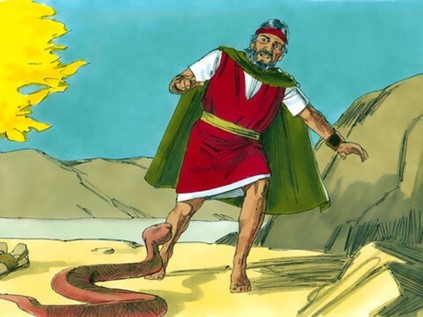
Moses still had a mental block against his people who rejected him. Moses risked his title of Egyptian prince to rescue his people from slavery, but they did not even recognize Moses’ intention to free them. They exposed Moses’ killing of an Egyptian slave driver the previous day and treated Moses as a threat to them, who might kill them. Thus, Moses was still hesitant to speak again to his people, but God gave Moses his brother, Aaron, as Moses’ spokesperson. It was the final negotiation with Moses. Then God left Moses, and Moses returned home.
As coming home, he gave deep thought to how to convince his wife and his father-in-law because they were dearly precious to Moses. His father-in-law, Jethro, was so kind to bring Moses, who was on the run, to his home and let Moses marry his daughter, Zipporah. Moses became nervous because he could not figure out how to tell his decision to go back to Egypt. However, God already touched their hearts before Moses even told his decision. When Moses told his plan to back to Egypt, Moses’ wife, Zipporah, immediately supported Moses’ plan, and his father-in-law was not so different. Moses did not ask about the support from Zipporah and Jethro, but God prepared the way before Moses. It is what God does for us even today. Thus, we can give thanks to God.
Before getting into the land of Egypt, his brother, Aaron, came to see Moses. Moses thanks God for giving His protection and guidance.
Moses followed Aaron to meet the people of Israelites. They were still in the same slavery, but they opened their hearts and welcomed Moses. What a difference made by forty years! Then Aaron explained what God told Moses on the Mountain of God, Sinai. Moses performed the miraculous signs as they watched. Then the people of Israelites were convinced that God had sent Moses. When they heard that God was concerned about them and had seen their misery, they bowed down and worshiped. What a day to the Israelites!
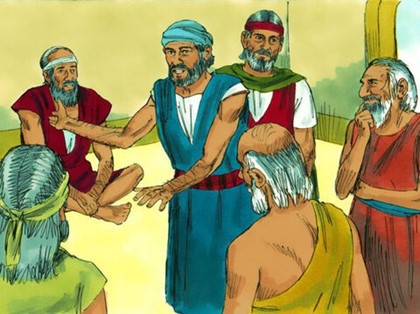
Throughout the night, Moses, Aaron, and the elders of Israelites discussed what to do next. They all agreed they should go together to Pharaoh to free the Israelites from slavery. As the sun rose, Moses and Aaron led the elders of Israel and walked up to the massive-looking palace. Moses felt that it would be almost impossible to pass the palace guards. However, Moses was wrong. God prepared the hearts of the palace guards, and one of the palace guards kindly brought them to the Pharaoh. Everything worked so smoothly without a hitch. To the eyes of Aaron and the people of Israelites, it was a miracle.
Moses, Aaron, and the elders felt God was with them, experiencing the miraculous moment. But it was not the end of the miracle. As the palace guard brought them to the Pharaoh, Pharaoh was kind enough to ask to speak up. All worked like clockwork, and it was the moment they should give thanks to God and fix their eyes on God. However, their eyes drifted away from God and saw the Pharaoh sitting high on his throne in his king’s robe, which dazzled their eyes. The Pharoah’s glory was far beyond their imagination.
On the other hand, Moses was a shepherd from a remote place in the Midian wilderness. Aaron and the elders were just slaves. What a stark contrast between the Pharaoh and them!
Moreover, Moses immediately recognized the Pharaoh sitting on the throne. The current Pharaoh was his rival prince. When the Pharaoh was a prince, he was always the 2nd best after Moses. Recognizing him was hard on Moses. The Pharoah did not recognize Moses at all. Moses looked at himself, who became a shepherd, but his lesser rival became the king of Egypt.
Soon the time came. The Pharaoh specifically asked why they came to him. Moses quickly crafted what to say to Pharaoh, gave it to Aaron, and Aaron conveyed it to Pharaoh. Moses did not want to speak with his voice to his ex-rival prince. Aaron told the Pharaoh, “This is what the LORD, the God of Israel, says: Let my people go so they may hold a festival in my honor in the wilderness.”
“Is that so?” retorted Pharaoh. “And who is the LORD? Why should I listen to him and let Israel go? I don’t know the LORD, and I will not let Israel go.”
But Aaron and Moses persisted. “The God of the Hebrews has met with us,” they declared. “So let us take a three-day journey into the wilderness so we can offer sacrifices to the LORD our God. If we don’t, he will kill us with a plague or with the sword.”
Moses could not faithfully convey what God asked Moses to say. What a puny and pity human heart! After experiencing God and His almighty power, Moses was still influenced by the surroundings, especially Pharaoh. Pharaoh was right before Moses, and Moses’ first concern was whether Pharaoh did listen to Moses’ request or not. To Moses’ eyes, Pharaoh was getting bigger, and God was getting smaller. Moses did his best to get Pharaoh’s permission.
Moses set up a stage to draw Pharaoh’s sympathy. Moses put God as the third person in their conversation, and God was cold-hearted to kill Moses and his fellow Israelites if they did not obey God’s command to go out three days and give sacrifice to God. How ridiculous Moses and his fellow Israelites were! The only person who could rescue Moses and his fellow Israelites was the Pharaoh.
What a convincing story Moses crafted! In his story, Pharaoh was not so bad, and even he could be a great hero who could rescue the entire Israelites so numerous from God’s hand. Moses thoughts that his speech given through Aaron was good enough to move the heart of Pharaoh. What a wonderful wisdom of Moses! Did it work as Moses intend by drawing out Pharaoh’s sympathy from his heart? Sadly no.
God had never said God would kill Israelites to Moses. Instead, God would kill Egyptians if Pharaoh refused to let Israelites go. Moses could not speak the truth. His human attempt was to move Pharaoh’s heart by adding his own clever idea as a part of his delivery of God’s message. Moses indeed distorted God’s message and missed the target set by God. By the definition of sin – missing the target set by God, Moses sinned. From that point, everything went down quickly. Of course, what Moses did is understandable, but Moses sinned against God to get Pharaoh’s favor.
Pharaoh replied, “Moses and Aaron, why are you distracting the people from their tasks? Get back to work! Look, many of your people are in the land, and you are stopping them from their work.”
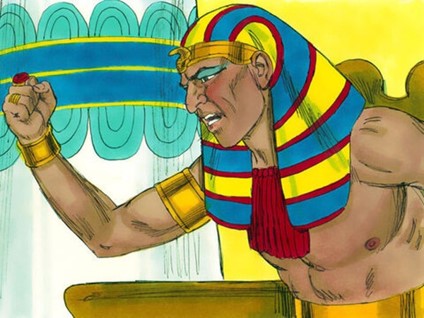
Then the Pharaoh ordered the palace guards to throw Moses, Aaron, and the elders from his royal court and the palace completely. The palace guards immediately made the Pharaoh’s order into action, and Moses, Aaron, and the elders suddenly found they gained nothing but made Pharaoh angry. They truly worried but went back to where they lived as slaves.
However, it was not the end of the story.
That same day Pharaoh sent this order to the Egyptian slave drivers and the Israelite foremen: “Do not supply any more straw for making bricks. Make the people get it themselves! But still require them to make the same number of bricks as before. Don’t reduce the quota. They are lazy. That’s why they are crying out, ‘Let us go and offer sacrifices to our God.’ Load them down with more work. Make them sweat! That will teach them to listen to lies!”
So the slave drivers and foremen went out and told the people: “This is what Pharaoh says: I will not provide any more straw for you. Go and get it yourselves. Find it wherever you can. But you must produce just as many bricks as before!” So the people scattered throughout the land of Egypt in search of stubble to use as straw.
Meanwhile, the Egyptian slave drivers continued to push hard. “Meet your daily quota of bricks, just as you did when we provided you with straw!” they demanded. Then they whipped the Israelite foremen they had put in charge of the work crews. “Why haven’t you met your quotas either yesterday or today?” they demanded.
So the Israelite foremen went to Pharaoh and pleaded with him. “Please don’t treat your servants like this,” they begged. “We are given no straw, but the slave drivers still demand, ‘Make bricks!’ We are being beaten, but it isn’t our fault! Your own people are to blame!”
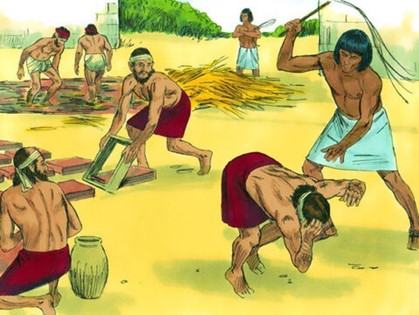
But Pharaoh shouted, “You’re just lazy! Lazy! That’s why you’re saying, ‘Let us go and offer sacrifices to the LORD.’ Now get back to work! No straw will be given to you, but you must still produce the full quota of bricks.” Did Moses get any sympathy from the Pharaoh? Absolutely no!
The Israelite foremen could see that they were in serious trouble when they were told, “You must not reduce the number of bricks you make each day.” As they left Pharaoh’s royal court, they confronted Moses and Aaron, who were waiting outside for them. The foremen said to them, “May the LORD judge and punish you for making us stink before Pharaoh and his officials. You have put a sword into their hands, an excuse to kill us!”
His own people gathered together and rejected Moses again. Moses thought he would have a good relationship with his people forever without experiencing the same bitter rejection. The first rejection caused him to spend forty years in the wilderness of Midian.
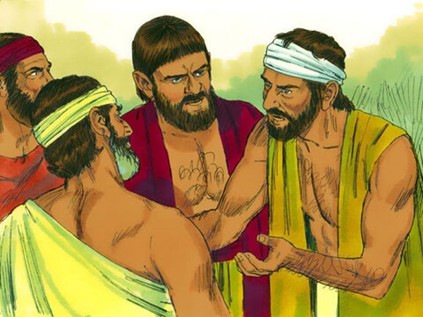
After the first rejection from his own people, Moses thought about dying. Then he even cursed about the day of his birth. Moses reasoned if he were not born, he would not have experienced such a bitter experience. He helped the others with a good heart while risking everything, but the others did not appreciate what he did. Instead, they exposed what Moses did – killing an Egyptian slave driver, although it was his killing for his fellow Israelites. Then the news quickly went to Pharaoh. Then Pharaoh sent his soldiers to capture and kill Moses. Moses recited, “Is there any good deed unpunished?” and looked up the sky in despair. Then Moses fled to the Midian wilderness and became a humble shepherd.
Deja Vu! The same bitter rejection came to Moses. It was the last thing that Moses wanted. It was why Moses refused when God came and gave the mission of rescuing His people. Now, Moses got the same rejection twice, which was truly unbearable.
Then Moses went back to the LORD and protested, “Why have you brought all this trouble on your own people, Lord? Why did you send me? Ever since I came to Pharaoh as your spokesman, he has been even more brutal to your people. And you have done nothing to rescue them!”
One thing that we want to make a note of Moses did not recognize his wrongdoing, i.e., sin. The long forty years of the lesson from God was not enough to teach Moses who God was and what the faith meant. Moses was too emotional to admit his sin. We can tell Moses’ heart by what he said to Pharaoh. But Moses could not hear himself. Indeed, Moses gave in the splendor of Pharaoh that he saw. Thus, Moses could not deliver God’s message without compromising it, which cost Moses. Moses was so blind to himself, and he argued all faults were with God, not him.
To Moses, his protest to God was legitimate. God did nothing, although he did everything for God to do what God told him to do so. How many times have we felt the same experience that Moses got? We did everything against all odds courageously. We even risked our precious relationship or our job for God’s work, but the result was a miserable failure. How do we feel? Don’t we feel God has abandoned us although we worked for God? Then people around us also leave us. None came up to us and said a comforting word. When we need most, can we find our friends and family? After getting this hard and miserable experience with God, many turn away from God by leaving Him completely, only remembering the bitter taste of God.
Let’s see what Moses did. Moses did not leave God, but he came back to God. Moses’ forty years of training helped Moses. Moses did not go away from God and returned to God, although he protested and argued with God. Why? Did Moses turn back to God? Moses still believed God could and would do what God promised. Forty years ago, Moses ran away from his people and God altogether, but now Moses came back to God. He actively searched for God to try to be with God, and he still stuck around with his people, despite his people’s rejection.
What is the faith, after all? Will we get a good thing from God if we do good before God? If this is our faith, how would we react if something bad happens, although we faithfully did our good before God? Should we leave God because God violates his goodness?
The flaw of the above argument is our interpretation of how God should govern this world. Nobody has seen God, and none has ever understood God. God is simply beyond us who created heaven and earth. Can we really dictate what God should do? If we know all things, including invisible, almighty, ever-loving God, we might reason and judge God without any logical flaw. However, we cannot. Thus, we believe in God and have faith in Him rather than understanding God and logically reducing what God should do. Thus, we believe first to understand God, and we praise God for His infinite goodness in our faith.
Let’s analyze Moses to learn more about God. Was Moses sinless? No, he even could not deliver God’s message faithfully and accurately. Moses might say it was close enough to convey the meaning of God’s message. However, Moses already minimized God by adding his own interpretation.
Why? Moses gave in to the worldly pressure originating from what he saw – the Pharaoh’s splendor sitting on high on his throne. How often did we compromise God’s message out of worldly pressure and fear of losing something precious to us, such as our relationship, job, position, honor, or respect? We naturally tend to protect God and what is precious to us, although it soon becomes the beginning of fall.
No one can serve two masters. For you will hate one and love the other; you will be devoted to one and despise the other. You cannot serve God and be enslaved to money. (Matthew 6:24)
Yes, Moses failed like many of us by being trapped in the temptation of compromising God to gain the world. If we were God and dearly loved Moses, what would we do as God? Would we kick out Moses as the Pharaoh did? No. God did not kick out Moses and heard Moses’ protest while having a big smile on His Face because Moses returned to God, which was good enough. Indeed, God let Moses fail and experience the same miserable rejection from his people. God allowed Moses to test his own faith before God. Moses had made the right choice for this time rather than going away from God.
Moses’ return pleased God because it was what God wanted from Moses. Moses protested and argued with God. Yes, it was what God wanted. Are there any parents who wish their children to go away after fall and failure? All parents want their children to come back, although they come back and argue, complain, and protest against their parents. To parents, it is far better than their children going away.
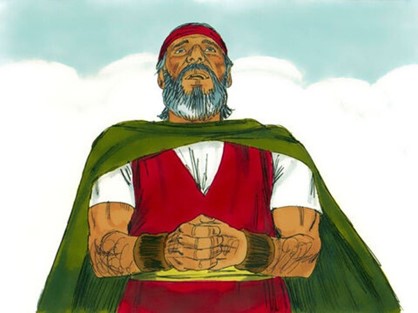
God heard Moses’ complaints carefully and patiently out of His infinite love. Moses indeed made yet another huge progress in his faith in God.
How about us? Will we go back to God after a huge failure? If the answer is yes, we truly know God’s heart.
God waits for us always, no matter what we do and what happens to us. Especially, God waits for us to come back when we are greatly hurt because of miserable failure despite faithfully keeping God’s word and working for God. Yes, God is waiting for us always.
Also, we constantly want to see ourselves in the light of God. Have we really 100% done only for God with all our heart, mind, and soul with absolutely no compromises? We know the answer. Thus, please don’t blame anyone, including God or ourselves. Even Moses failed even after Moses had gone through forty years of God’s special training. Then what can we say about ourselves?
God is good. His goodness never changes. His faithfulness always shines like a morning rising sun. Let’s fix our eyes on Him. If not, our eyes will drift away from Him and focus on our desire and fear of the world. Then God let us fail to see our fall and failure with our own eyes. Failure is the sign from God that God truly wants us. As soon as we realize this truth, we must go back to God immediately because God is eagerly waiting for us.
God is good to us, and He is always with us. Why is He good to us always? Because Our God is our Ever-loving Father. He will never forsake us. He loves us forever, which is the truth and our faith. Thus, we always come to Our God and rest in Him.
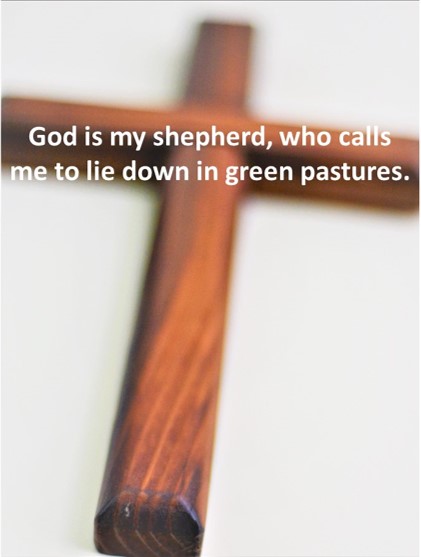
The LORD is my shepherd; I shall not want.
He makes me lie down in green pastures.
He leads me beside still waters.
He restores my soul. (Psalm 23:1-2)
